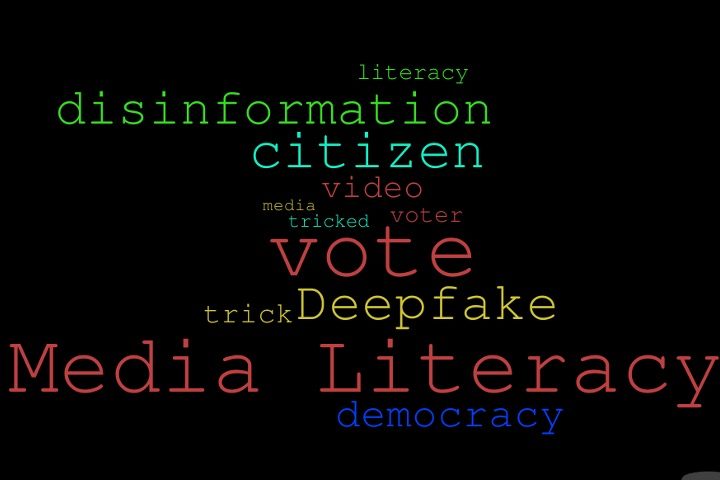
Artificial intelligence and deepfake technology are threatening to further erode public trust in the electoral process, The Epoch Times reported October 27.
The Times article defines deepfakes as “highly convincing and deceptive digital media—typically videos, audio recordings, or images—increasingly generated using artificial intelligence, and often for misleading or fraudulent purposes.”
Quoting an AI tech entrepreneur, the article prepares readers for a 2024 election that could be destabilized by deepfakes that are advanced to the degree that average voters won’t know whether they’re listening to/watching the actual candidate or some computer-generated approximation designed specifically to fool voters.
“2024 is going to be the deepfake election in ways that previous elections weren’t,” said Rijul Gupta, co-founder and CEO of DeepMedia_AI. “It is only becoming prevalent in 2024, and that’s because of access to this technology. Basic versions of this technology existed in 2020, but the quality wasn’t good enough to fool people. People could still tell it was fake.”
According to Gupta’s inside information, deepfakes in use today are sophisticated enough to deceive voters relying on social media for their information.
“They’re not looking for a fake,” he said, as quoted by the Times. “They’re not trying to determine that it’s fake. It sounds real to them, so they just assume it’s real. But the last thing that was needed for this to really become a massive problem was access. So the first hurdle was quality, and that was just accomplished last year. The second hurdle was access.”
Perhaps most menacing regarding the dissemination of reliable candidate communication is the fact that so much of this technology — the ability to create believable deepfakes — is available to anyone with a smart phone.
“Most of the time, you don’t even need a credit card, and you can create deep fakes of anyone in just five seconds,” Gupta told the Times. “That is what’s new. That’s what has just happened in the past few months—and that’s why 2024 is going to be the deepfake election.”
It’s an issue that “keeps me up at night,” he added.
Believe it or not, the nightmare is more terrifying than Gupta lets on.
To be fair, though, it isn’t just partisan influencers with smart phones and AI apps that will be creating and sharing computer-generated deepfakes with an eye toward creating confusion and undermining the electoral process. Consider this story I reported in March for The New American:
United States Special Operations Command (SOCOM) is “gearing up to conduct internet propaganda and deception campaigns online using deepfake videos,” according to contracts with the federal government reviewed by The Intercept….
Of particular interest on the list is a section called “Advanced technologies for use in Military Information Support Operations (MISO),” interpreted by the The Intercept as “a Pentagon euphemism for its global propaganda and deception efforts.” Here’s how The Intercept described the contents of that disturbing part of the procurement request:
“The added paragraph spells out SOCOM’s desire to obtain new and improved means of carrying out ‘influence operations, digital deception, communication disruption, and disinformation campaigns at the tactical edge and operational levels.’ SOCOM is seeking ‘a next generation capability to collect disparate data through public and open source information streams such as social media, local media, etc. to enable MISO to craft and direct influence operations.’”
In other words, the United States Department of Defense has been hiring hackers for the purpose of creating deepfakes that are indistinguishable from actual images and that will be used to disrupt communication and spread disinformation.
This story and the detailed insights into the world of election tampering and manipulation of the masses through media makes it clear that, beyond just the traditional armies that could conquer a country, we must be prepared to defend ourselves against invisible soldiers armed not with machine guns firing deadly bullets, but with laptops controlling social media accounts and other sources of information and influence.
The insidious effect this has on the electoral process is perhaps more devastating than many perceive.
Not only is the outcome of elections placed into reasonable doubt, but the entire process becomes one regarded by many as unreliable, and thus unnecessary.
It isn’t too far-fetched to imagine a scenario where the mouthpieces of the Deep State — as well as those politicians supported by it — will work to undermine and delegitimize voting to such an advanced degree that many conservative Americans won’t bother voting, rightly regarding the system as so corrupt as to make voting irrelevant. Those Americans who benefit — knowingly or not — from the Deep State will show up to vote on Election Day, giving the government the “data” and “proof” it needs to show that Americans just don’t support the Americanist or conservative agenda.
This is not the subplot of a dystopian novel; this is the current climate in the United States of America, where our own government is actively recruiting programmers who can create computer-generated deepfakes believable enough to fool most people. Additionally, there are any number of partisans and progressives who are working as free agents toward the same goal: spread disinformation, foment confusion, and delegitimize the electoral process to the point where conservative voters lose all trust in the system and refuse to participate in the charade.
There is hope in history, however, patriots. Such schemes are not new and don’t have to be successful. We can, as did Patrick Henry, use history as the lamp by which we guide our feet going forward.
Sometime in the fourth century B.C., the Greek philosopher Aristotle wrote a guidebook to good governance known as Politics.
Book 5 of Politics reveals the ancient Deep State’s efforts to undermine free elections.
Aristotle related that agitators, after igniting fires of faction, will aim “to get gain and honor by creating conflict and partisan fighting to prevent themselves and their friends from experiencing any dishonor or loss.”
In order to accomplish their insidious plans to completely destroy the commonwealth through the constant clashing of political parties, these instigators finally will resort to “election intrigue” to confuse citizens and force those who are fed up with the fighting to look to tyrants for relief, thus once and for all annihilating liberty.
Click here to learn more about how election integrity in America can be restored.



